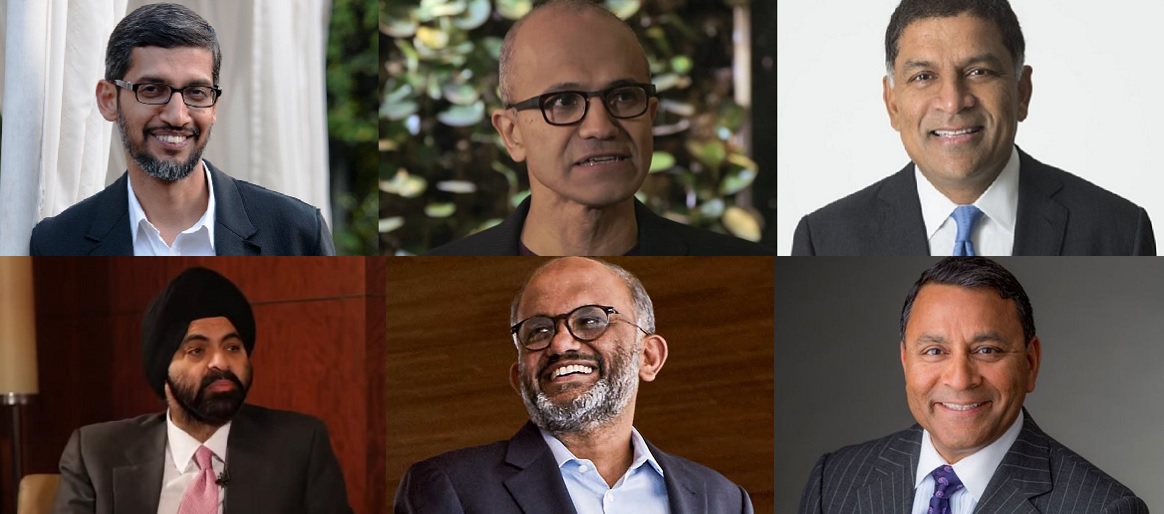Why do foreign companies love Indian CEO’s ?

Indians have played a key role in the success of tech powerhouses around the world. From Google to Microsoft, Cognizant to NetApp, Indians run some of the biggest and best companies in the world. Recently, copier giant Xerox appointed Infosys veteran and former iGate CEO Ashok Vemuri as CEO of its back-office outsourcing firm.Vemuri’s survey is another milestone for his CEO, who is of Indian descent, at least six of whom work for his Fortune 500 companies. Let’s talk about a few famous CEO’s who are ruling all over India.
India-born Sundar Pichai was named as Google CEO on August 10, 2015. The 44- year-old head of Google was born in Chennai, Tamil Nadu and pursued education at IIT Kharagpur (B Tech), Stanford (MS) and Wharton (MBA); at Wharton, he was named a Siebel Scholar and Palmer Scholar. He is responsible for the launch of the dominant Chrome web browser, and was previously the product head for Android, Chrome, Maps, and other popular Google products.
Another one is Shantanu Narayan, the CEO of Adobe. Shantanu was born in Hyderabad, and he joined Adobe in 1998 as the senior vice president of worldwide product research and became the COO in 2005 and CEO in 2007. He holds a Bachelor in Science from Osmania University, an MBA from University of California, Berkley, and an MS from Bowling Green State University. Narayen held product development roles at Apple and Silicon Graphics before co-founding photo-sharing startup Pictra. A chance encounter between Adobe and Pictra led to Narayen joining Adobe, where rose swiftly through the product ranks. He was named among the world’s best CEOs by Barron’s Magazine in 2016.
Another famous CEO is Rajeev Suri who joined Nokia in 1995 and held various positions before being appointed as president and CEO in April 2014. Suri’s superiority to Nokia CEO’s position, came after Microsoft acquired Nokia’s mobile phone business. Previously, he was the head of the company’s global services. Suri also holds a B-Tech from Manipal Institute of Technology, but holds no post graduate degrees.
There must be a reason why so many Indians and not others from emerging countries like China, Russia or Japan have made eminent corporate careers? What is it that makes Indians so uniquely appropriate for the top slot at tech firms and why do foreign companies love these Indian CEO’s.
The answers are quite straightforward and simple. Indians managers succeed because they never give up. They have the perseverance to advance steadily within one organization rather than jumping to another organization occasionally in exchange for a little extra cash. They have “achieved” for what they are right now, not “become.” Nadella was appointed CEO of Microsoft after working diligently there for more than 20 years. Sundar Pichai had also been employed by Google since 2004. Nooyi began working with PepsiCo in 1994 and has been there ever since. Additionally, Anshu Jain, Menezes, and Narayen have steadily worked for their respective companies for over ten years. Regarding Indians, it’s also crucial to note that they are very humble at work. Also the Indian CEO’s have expertise, are responsible, educated, competent and secular. The fact that Indians are able to dream and are more focused on long-term solutions adds to these considerations. We need to remove the improbable and believe in the impossibly,” Nadella wrote in his inaugural email to all Microsoft employees.
Indian CEOs focus more on getting things done than they do on just delivering orders. Additionally, CEOs from India often prioritize long-term objectives over short-term benefits and have a great awareness of corporate ethics and how to reach the bigger aims. Another angle to consider is the growth pace and opportunities the Indian market presents to global businesses. International businesses that want to enter the Indian market want a market expert who can support smooth operations inside India. Therefore, choosing a CEO from within the nation provides the business a competitive advantage.
It is increasingly recognised that a CEO or leader needs to be a multifaceted leader who can not only oversee the operations of the firm but also carry out its vision and advance it. He or she must consider the big picture before making crucial choices. Indian CEOs should also keep in mind that different geopolitical strategies must be used depending on the demands of the business and the market they are serving. Overall, we’ve seen Indian leaders repeatedly demonstrate their mettle on the international stage, but we can still do better at handling delicate situations at work and very soon we’ll see more Indians in the “Global Board Room”.
Name- Bhavya Khurana
Course- BA hons English
University- Delhi University (Dyal Singh College)




